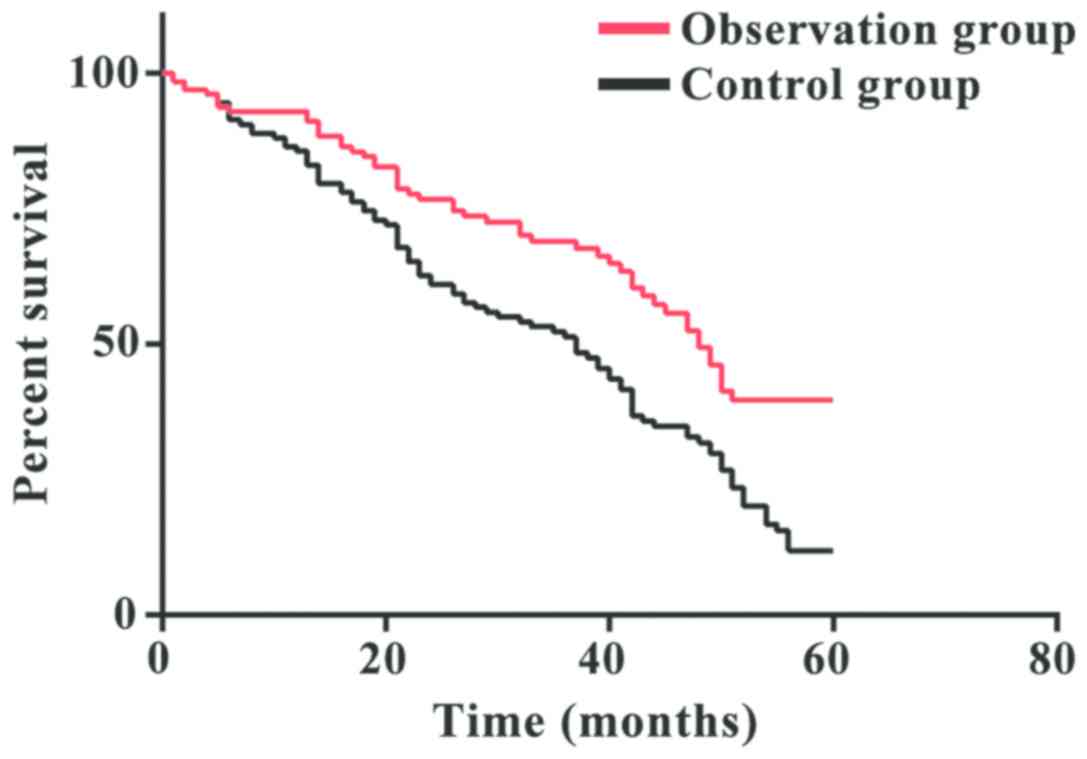|
1
|
Ferlay J, Soerjomataram I, Dikshit R, Eser
S, Mathers C, Rebelo M, Parkin DM, Forman D and Bray F: Cancer
incidence and mortality worldwide: Sources, methods and major
patterns in GLOBOCAN 2012. Int J Cancer. 136:E359–E386. 2015.
View Article : Google Scholar : PubMed/NCBI
|
|
2
|
Torre LA, Siegel RL, Ward EM and Jemal A:
Global cancer incidence and mortality rates and trends - An update.
Cancer Epidemiol Biomarkers Prev. 25:16–27. 2016. View Article : Google Scholar : PubMed/NCBI
|
|
3
|
Goday A, Barneto I, García-Almeida JM,
Blasco A, Lecube A, Grávalos C, Martínez de Icaya P, de las Peñas
R, Monereo S, Vázquez L, et al: Obesity as a risk factor in cancer:
A national consensus of the Spanish Society for the Study of
Obesity and the Spanish Society of Medical Oncology. Clin Transl
Oncol. 17:763–771. 2015. View Article : Google Scholar : PubMed/NCBI
|
|
4
|
Eble JN and Delahunt B: Emerging entities
in renal cell neoplasia: Thyroid-like follicular renal cell
carcinoma and multifocal oncocytoma-like tumours associated with
oncocytosis. Pathology. 50:24–36. 2018. View Article : Google Scholar : PubMed/NCBI
|
|
5
|
Santoni M, Conti A, Partelli S, Porta C,
Sternberg CN, Procopio G, Bracarda S, Basso U, De Giorgi U, Derosa
L, et al: Surgical resection does not improve survival in patients
with renal metastases to the pancreas in the era of tyrosine kinase
inhibitors. Ann Surg Oncol. 22:2094–2100. 2015. View Article : Google Scholar : PubMed/NCBI
|
|
6
|
Pérez-Herrero E and Fernández-Medarde A:
Advanced targeted therapies in cancer: Drug nanocarriers, the
future of chemotherapy. Eur J Pharm Biopharm. 93:52–79. 2015.
View Article : Google Scholar : PubMed/NCBI
|
|
7
|
Choueiri TK, Halabi S, Sanford BL, Hahn O,
Michaelson MD, Walsh MK, Feldman DR, Olencki T, Picus J, Small EJ,
et al: Cabozantinib versus sunitinib as initial targeted therapy
for patients with metastatic renal cell carcinoma of poor or
intermediate risk: The alliance A031203 CABOSUN trial. J Clin
Oncol. 35:591–597. 2017. View Article : Google Scholar : PubMed/NCBI
|
|
8
|
Jiao Y, Xin BT, Zhang Y, Wu J, Lu X, Zheng
Y, Tang W and Zhou X: Design, synthesis and evaluation of novel
2-(1H-imidazol-2-yl) pyridine Sorafenib derivatives as potential
BRAF inhibitors and anti-tumor agents. Eur J Med Chem. 90:170–183.
2015. View Article : Google Scholar : PubMed/NCBI
|
|
9
|
Zhai B, Jiang X, He C, Zhao D, Ma L, Xu L,
Jiang H and Sun X: Arsenic trioxide potentiates the anti-cancer
activities of sorafenib against hepatocellular carcinoma by
inhibiting Akt activation. Tumour Biol. 36:2323–2334. 2015.
View Article : Google Scholar : PubMed/NCBI
|
|
10
|
Flaherty KT, Manola JB, Pins M, McDermott
DF, Atkins MB, Dutcher JJ, George DJ, Margolin KA and DiPaola RS:
BEST: A randomized phase II study of vascular endothelial growth
factor, RAF kinase, and mammalian target of rapamycin combination
targeted therapy with bevacizumab, sorafenib, and temsirolimus in
advanced renal cell carcinoma - A trial of the ECOG-ACRIN cancer
research group (E2804). J Clin Oncol. 33:2384–2391. 2015.
View Article : Google Scholar : PubMed/NCBI
|
|
11
|
Ljungberg B, Bensalah K, Canfield S,
Dabestani S, Hofmann F, Hora M, Kuczyk MA, Lam T, Marconi L,
Merseburger AS, et al: EAU guidelines on renal cell carcinoma: 2014
update. Eur Urol. 67:913–924. 2015. View Article : Google Scholar : PubMed/NCBI
|
|
12
|
Shahabi V, Postow MA, Tuck D and Wolchok
JD: Immune-priming of the tumor microenvironment by radiotherapy:
Rationale for combination with immunotherapy to improve anticancer
efficacy. Am J Clin Oncol. 38:90–97. 2015. View Article : Google Scholar : PubMed/NCBI
|
|
13
|
Lin HH, Feng WC, Lu LC, Shao YY, Hsu CH
and Cheng AL: Inhibition of the Wnt/β-catenin signaling pathway
improves the anti-tumor effects of sorafenib against hepatocellular
carcinoma. Cancer Lett. 381:58–66. 2016. View Article : Google Scholar : PubMed/NCBI
|
|
14
|
Raman R and Vaena D: Immunotherapy in
metastatic renal cell carcinoma: A comprehensive review. BioMed Res
Int. 2015:3673542015. View Article : Google Scholar : PubMed/NCBI
|
|
15
|
He C, Dong X, Zhai B, Jiang X, Dong D, Li
B, Jiang H, Xu S and Sun X: MiR-21 mediates sorafenib resistance of
hepatocellular carcinoma cells by inhibiting autophagy via the
PTEN/Akt pathway. Oncotarget. 6:28867–28881. 2015. View Article : Google Scholar : PubMed/NCBI
|
|
16
|
Ma X, Shen D, Li H, Zhang Y, Lv X, Huang
Q, Gao Y, Li X, Gu L, Xiu S, et al: MicroRNA-185 inhibits cell
proliferation and induces cell apoptosis by targeting VEGFA
directly in von Hippel-Lindau-inactivated clear cell renal cell
carcinoma. Urol Oncol. 33:169.e1–169.e11. 2015. View Article : Google Scholar
|
|
17
|
Bil J, Zapala L, Nowis D, Jakobisiak M and
Golab J: Statins potentiate cytostatic/cytotoxic activity of
sorafenib but not sunitinib against tumor cell lines in vitro.
Cancer Lett. 288:57–67. 2010. View Article : Google Scholar : PubMed/NCBI
|
|
18
|
Takahashi Y, Mai M, Taguchi T, Urushizaki
I and Nishioka K: Prolonged stable disease effects survival in
patients with solid gastric tumor: Analysis of phase II studies of
doxifluridine. Int J Oncol. 17:285–289. 2000.PubMed/NCBI
|
|
19
|
Yang GW, Jiang JS and Lu WQ: Ferulic acid
exerts anti-angiogenic and anti-tumor activity by targeting
fibroblast growth factor receptor 1-mediated angiogenesis. Int J
Mol Sci. 16:24011–24031. 2015. View Article : Google Scholar : PubMed/NCBI
|
|
20
|
Galluzzi L, Buqué A, Kepp O, Zitvogel L
and Kroemer G: Immunological effects of conventional chemotherapy
and targeted anticancer agents. Cancer Cell. 28:690–714. 2015.
View Article : Google Scholar : PubMed/NCBI
|
|
21
|
Eichelberg C, Vervenne WL, De Santis M,
Fischer von Weikersthal L, Goebell PJ, Lerchenmüller C, Zimmermann
U, Bos MM, Freier W, Schirrmacher-Memmel S, et al: SWITCH: A
randomised, sequential, open-label study to evaluate the efficacy
and safety of sorafenib-sunitinib versus sunitinib-sorafenib in the
treatment of metastatic renal cell cancer. Eur Urol. 68:837–847.
2015. View Article : Google Scholar : PubMed/NCBI
|















